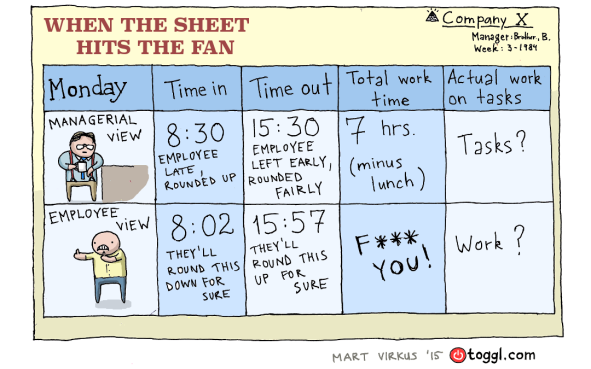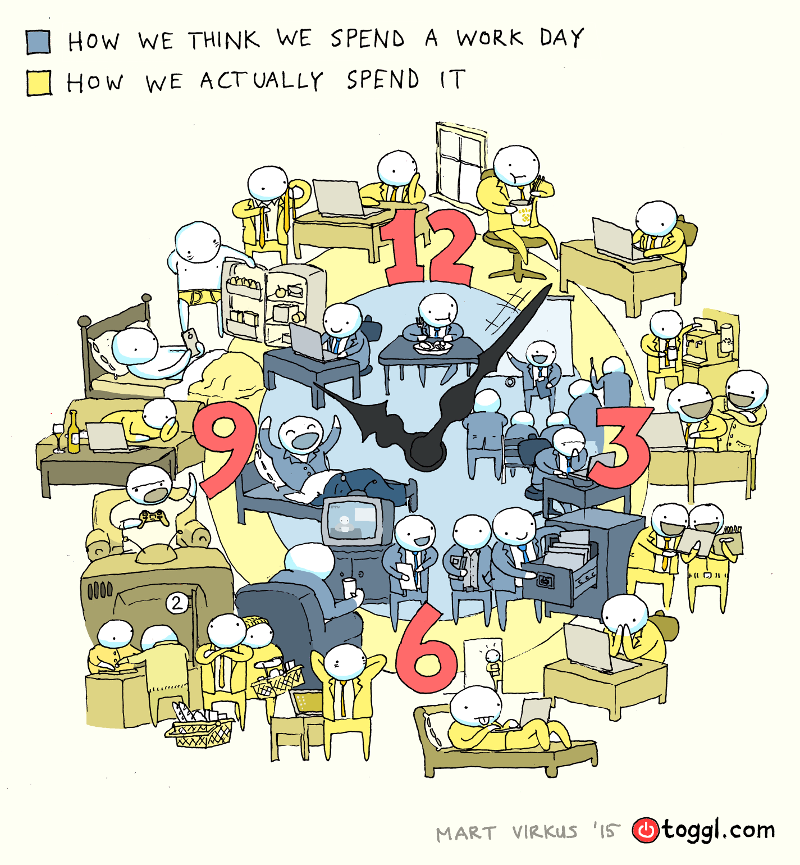Look, keeping track of where your work time really goes is important–be it for analyzing your productivity, billing clients, or tracking big projects. But I think we can all agree that paper timesheets suck for doing that.
I have a strong aversion to spreadsheets and while my work requires their use to some extent, I’ve become rather adept at avoiding them. That’s mostly because I don’t like unnecessary bureaucracy.

That is to say, I don’t believe in counting steps when running toward the finish line.
Unless something does the counting for me.
And this, I think, is the difference between using a timesheet and using time tracking. The former is hugely unproductive for three big reasons, the first one being the fact that:
1. Timesheets are inaccurate (and full of lies)
Why timesheets suck
Timesheets are not accurate reflections of a workday. This is because the human brain isn’t all that good with understanding time. Research has shown that our perception of time is highly subjective.

Guessing how long one task has taken in the past (or how long another one might in the future) is often about as accurate as Ray Charles at a long distance sniper range.
When you’re filling in your timesheet at the end of a workday, chances are you won’t remember how much time exactly you spent on specific activities. For example, our brains tend to perceive boring tasks as having taken more time. By contrast, time seems to pass quicker when we’re having fun.
Consequently, timesheets don’t work because they tell you lies about how you work.
So, how can a timekeeping app help?
In short – chips don’t lie.
A timekeeping app can track your time spent on tasks for you. Since timers don’t lie, you’ll get an accurate overview of not just time spent on work, but also time spent on breaks, lunch and – if you insist on being super specific – toilet breaks.
And being specific is important – time tracking only makes sense if it reflects the reality of time spent. Yes, you need a bit of time for the tracking habit to form, but it’s still a lot less work than filling in a timesheet.
By the way, this takes us to problem number two with timesheets, namely that…
2. Filling in Timesheets wastes time and energy
Why timesheets suck
Filling in timesheets takes up an unreasonable amount of time. This is somewhat ironic, given that timesheets are supposed to help you manage your time better. But instead, you’ll have to spend precious time on filling in your timesheet.
To make matters worse, someone else has to go through the logs later. Organising employee timesheets into a system too becomes a massive time sink.
Also, not only does writing down a log of your work waste time, it also wastes precious energy.
Remember when you had so much fun filling in a timesheet, and felt so rested after doing it?
Yeah, exactly.
Right, so how do I track time without wasting time?
The good thing about a timekeeping app is that it does things for you. It runs in the background, grinding the numbers and generating reports in the process.
Of course, you still need to push a few buttons. I’ve argued before, that it is actually very important for the human user to acknowledge and interact with a time tracking app. A machine can’t change us if we don’t want to listen to it (at least, until the robot uprising of 2020).
Also, clicking “start” and “stop” every now and then helps you stay focused by forcing you to actively think about your time usage. This works wonders for people who are prone to multitasking and veering off course.
3. Success is measured in work done, not time spent
The short point is – don’t fetishise time.
You don’t go to work to be at work – you go there to get things done.
There is no point in getting daily confirmations of staff occupying their desks for a satisfactory amount of time, or for work time having been kept below an arbitrary threshold. Especially if the data you get is wrong.

Nobody sits down at 9 AM and works literally non-stop on-task (lunch break excluded) till 5 PM. We take breaks (or at least, we really, really should), and we daydream (which is important for productivity too). A lot of stuff happens between the work.
There’s a name for people that claim otherwise.
But I won’t say it here.
Though it rhymes with “pants on fire”.
So what’s the point of time tracking, again?
Let’s leave aside the obvious reason – the rather common need to bill clients based on hours. Other than this very practical consideration, the point is to understand the time cost of things.
It’s not about creating work hours, it’s about learning to be smarter with the hours you’ve got.
Do you know how much time you waste on multitasking every week? Use the timer to find out (and expect to be rather shocked). You might find out that while you clock in the required eight hours at the office every day, you spend half of that time trying to juggle way too many things at once.
With that in mind, what is the benefit of a timesheet app telling you you’ve worked for eight hours today?
None, really. But there is a benefit in looking at the smaller chunks.
Tracking the individual parts of your day, you might be shocked to find out that a monumentally boring task of what you think amounts to epic proportions turns out to be only a minor time sink – if only you sat down and dealt with it in one go.
Of course, you musn’t get too obsessed and let time tracking turn into a second job. But time spent on clicking on a timer every now and then is minuscule when compared to time wasted on inaccurate reporting, poor estimates and bad scheduling.
And yeah, replanting rainforests takes time too.
Save the trees.
Know anyone still using pen and paper? Let them know that we’ve moved up a century and share this on Twitter!
What do you use time tracking for? Share your tips with other Togglers in the comments.
Mart has a background in anthropology - a discipline which has turned people-watching into a science. He most enjoys working on projects that make you go from “that’s stupid” to “hmmm”.

